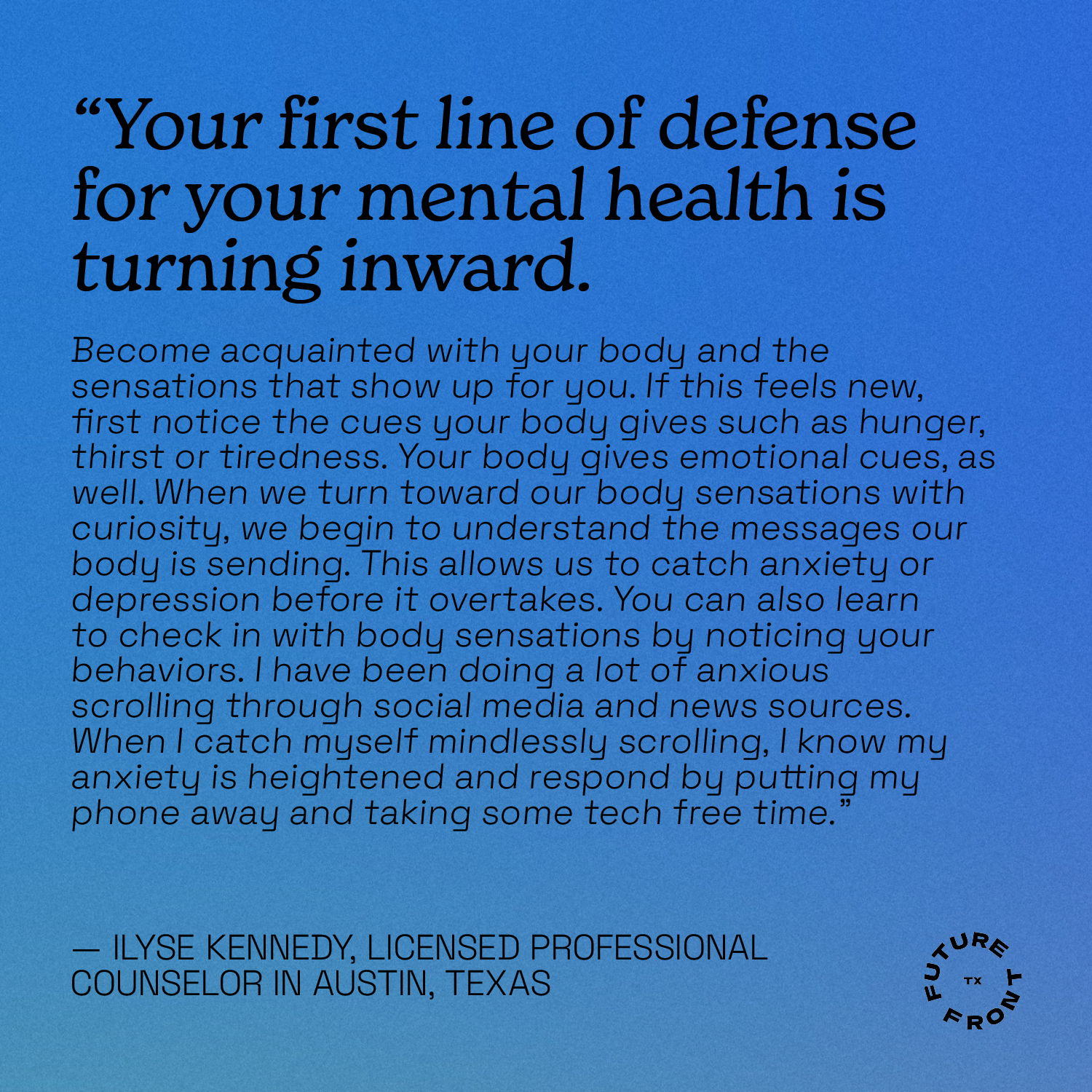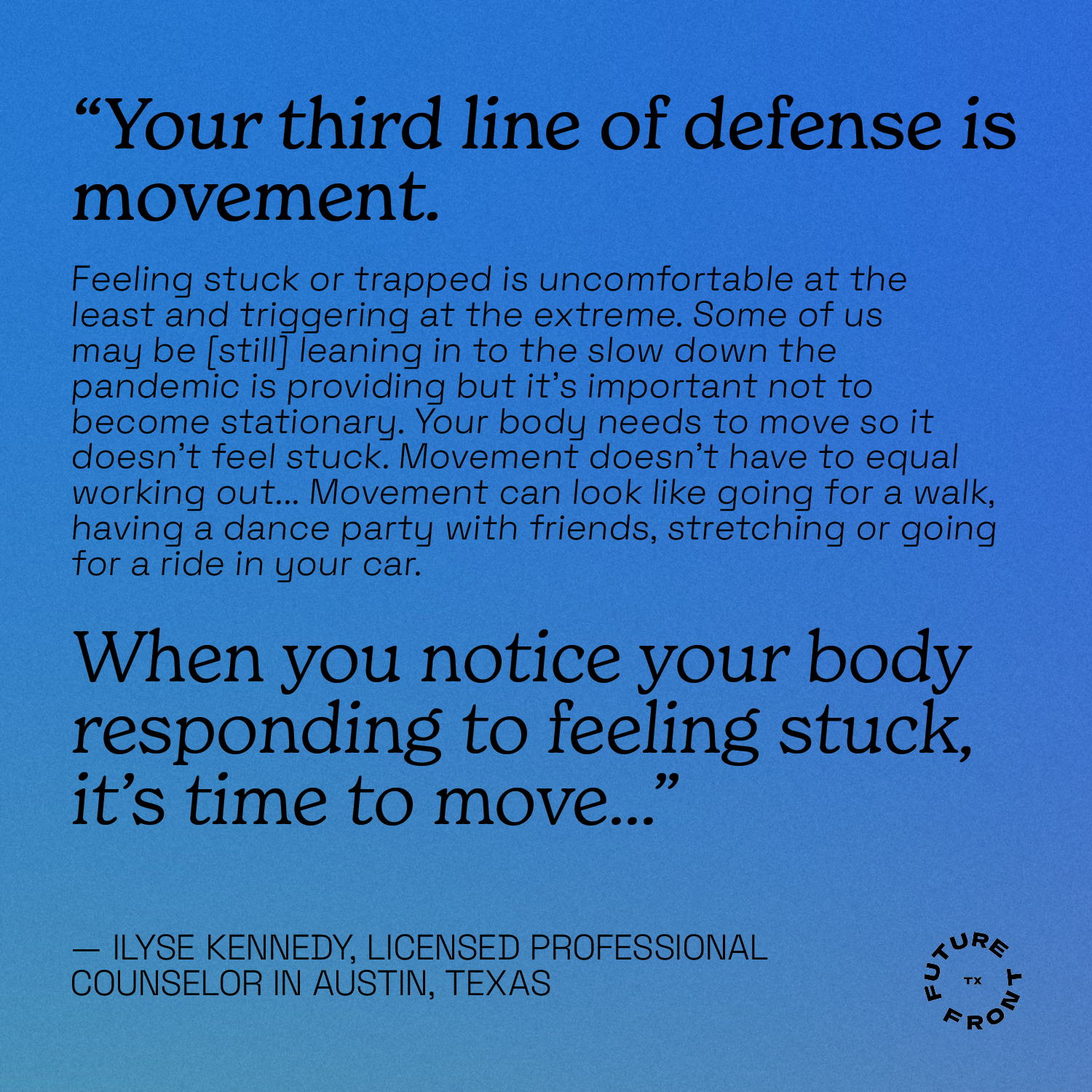How To Care For Your Mental (And Creative) Health In A Crisis
In mitigating the spread of coronavirus, our communities and country at-large have made rapid changes regarding the use of public spaces, social interactions and local businesses. We know these changes have left many of us grappling with financial fears, navigating abrupt interruptions to our lifestyles and work, while also disrupting access to the things we need.
So, today, we’re republishing a guide by former Future Front committee member and Licensed Professional Counselor Ilyse Kennedy. Written in 2020, she shares her thoughts on caring for our mental health while in a crisis.
As a mental health professional, my anxiety has been heightened as the COVID-19 pandemic escalates.
I keep hearing the phrase “this is a time of uncertainty,” and it’s easy to get swept away in the uncertainty and unknowns. Our nervous systems are in survival mode, jumping into action to protect us. Our senses are heightened, worried we—or a loved one—could get sick at any moment. Jobs are being lost, social connections cut off, and the sense of normalcy diminished.
I want to say out loud, and normalize, that this is scary.
I am scared and it’s okay if you are, too. It’s not my job to push my anxiety away or completely diminish my fears because my job requires me to be human, too. Instead, I’m staying a few steps ahead of the folks I serve so I can best support their own fears and anxieties during this time but also name, that yes, this is scary. This is a trauma the world is experiencing together. Physical health and mental health go hand in hand and it’s important we preserve our mental health the best we can during this time.
So, caring for your mental health is essential right now.
For those of us with past trauma, we might notice triggers being activated due to feeling “stuck” or “trapped” at home. Depression might become activated due to feelings of hopelessness and isolation. Your anxiety may also be heightened to the grim state of the world and sense of uncertainty.
The four things we need most during times of anxiety and trauma are:
Turning Inward
Social connection.
Mobilization/Movement
Consistency
Your first line of defense for your mental health is turning inward.
Become acquainted with your body and the sensations that show up for you. If this feels new, first notice the cues your body gives such as hunger, thirst or tiredness. Your body gives emotional cues, as well. When we turn toward our body sensations with curiosity, we begin to understand the messages our body is sending. This allows us to catch anxiety or depression before it overtakes. You can also learn to check in with body sensations by noticing your behaviors. I have been doing a lot of anxious scrolling through social media and news sources. When I catch myself mindlessly scrolling, I know my anxiety is heightened and respond by putting my phone away and taking some tech free time.
Your second line of defense is social connection.
While we need to physically isolate, it is essential we don’t emotionally isolate. As humans, we are primed to seek connection. From birth, the first thing we look for is the warmth and connection of a caregiver. This seeking of connection never stops. While we are each experiencing the pandemic differently, we are all in this together. Sharing those feelings out loud with others helps to normalize this. There may be some grief in thinking about not seeing friends and family in person for some time, that’s okay. We are lucky to live in a time of advanced technology where we can find creative ways to connect. We can watch TV shows with each other over FaceTime, play games online, have large Google Hangouts. In the past week, I’ve spent more time watching reality television with friends than I have ever before and it feels amazing to revisit LuAnn De Lesseps recording “Money Can’t Buy You Class” while laughing about that iconic moment with a friend. This is a time where we need to lean in to community.
Your third line of defense is mobilization and movement.
Feeling stuck or trapped is uncomfortable at the least and triggering at the extreme. Some of us may be leaning in to the slow down the pandemic is providing but it’s important not to become stationary. Your body needs to move so it doesn’t feel stuck. Movement doesn’t have to equal working out, though many classes are available virtually at the moment. Movement can look like going for a walk, having a virtual dance party with friends, stretching or going for a ride in your car. When you notice your body responding to feeling stuck, it’s time to move to remind your body you are able to mobilize.
Your fourth line of defense is consistency.
When everything is chaos, look for the things you can control and the things that stay the same. If you feel yourself getting swept up in the chaos, make a list of everything you can control. Create a daily schedule. Re-watch a familiar TV show or movie. Try new recipes with the ingredients you have available to you. Pick a consistent scent to have on hand to help ground you. Pick a small goal you can achieve each day.
Know that mental healthcare is available even through social distancing, too.
Most therapists have transitioned to tele-health so if you need extra support during this time, don’t hesitate to ask your therapist of choice if they are offering tele-health. Many therapists are also offering reduced rate sessions at this time. The following are sliding scale therapy options for those in need:
LOOKING FOR MORE?
ABOUT THE AUTHOR, Ilyse Kennedy: Ilyse (she/her) is a Licensed Professional Counselor and Licensed Marriage and Family Therapist who is the owner and practices out of Moving Parts Psychotherapy in South Austin, TX. Following a stint in the music industry of Los Angeles, she recognized she wanted to help marginalized communities heal from trauma rather than getting coffee for cranky white men. She specializes in working with trauma, perinatal mental health, children, and adolescents. She began her therapy career working with girls and their incarcerated mothers at Girl Scouts Beyond Bars, where she began her interest in intergenerational trauma healing. She still loves music and especially enjoys supporting the Austin music community. When not therapizing, she can be found on adventures trailing behind two wild toddlers.





